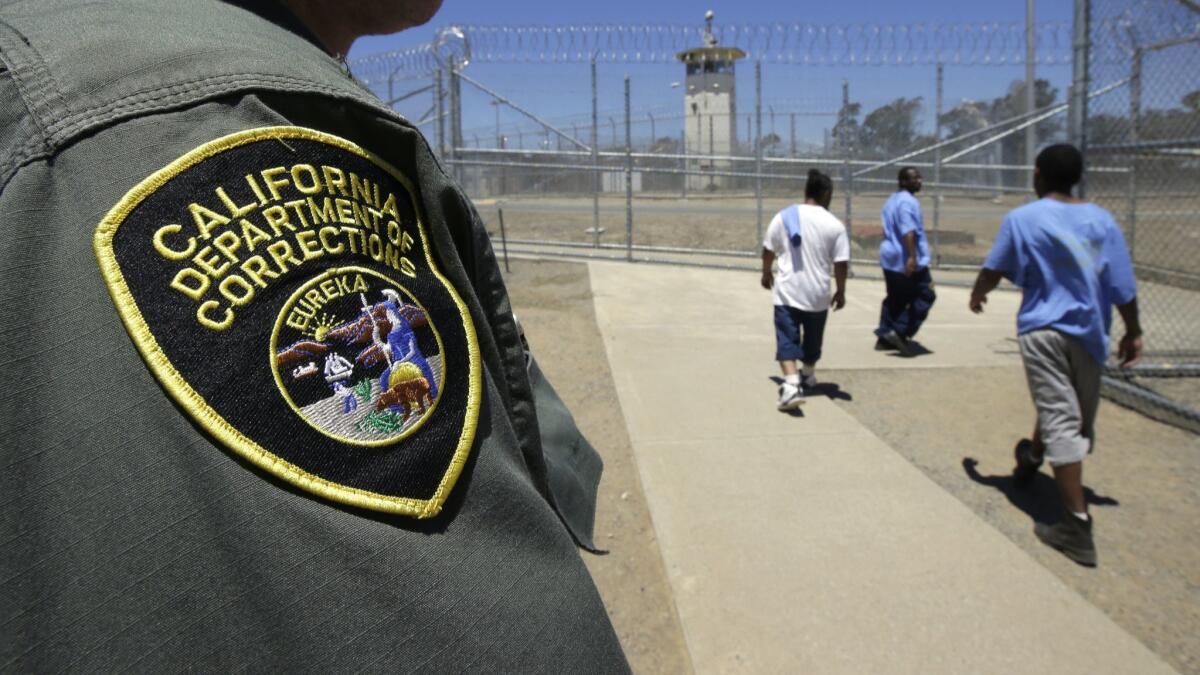Column: Once an electoral juggernaut, California’s prison-guard union steps back into the spotlight

- Share via
The old adage that California government has three main functions — to educate, medicate and incarcerate — is a handy road map for where to find some of the state’s most politically powerful players. For a time, none was more active or feared than the union representing prison guards.
But while unions representing teachers and nurses have remained a constant presence, the California Correctional Peace Officers Assn. seemed to step back from the spotlight over the past decade. The CCPOA remained a political force but eschewed the kind of splashy statewide campaigns that had made it an electoral juggernaut.
“They have not been as visible, but they have been active,” Richard Temple, one of the CCPOA’s longtime political consultants, said last week.
Last week, the organization inched back toward its high-profile past by spending $1 million for television commercials promoting two Democrats: Lt. Gov. Gavin Newsom for governor and Richmond Assemblyman Tony Thurmond for superintendent of public instruction. That’s not huge money for TV ads in California. But it was a reminder that the union still has what it takes to bring attention to its almost 27,000 prison officers who pride themselves on “walking the toughest beat in the state,” as their slogan says.
A quiet and important fight is brewing over how much must be spent on California’s schools »
The political muscle of the CCPOA grew as California lawmakers focused on anti-crime measures in the late ’80s and into the ’90s. More punishment meant more prisoners — which, in turn, meant more correctional officers. The union quickly mastered the art of Sacramento lobbying and statewide campaigning.
The group was hardly shy. In 1988, amid debate over building a new state prison in Los Angeles, the group audaciously gave a $10,000 award to a Republican lawmaker who cut short her medical leave to vote for the project. There was a swagger, too, in large campaign contributions to the gubernatorial campaigns of Pete Wilson in 1990 and 1994.
The officers’ union switched political party loyalties in 1998, putting $2 million into the campaign of Democrat Gray Davis to succeed Wilson. Both governors agreed to pay raises and championed tough-on-crime laws.
When Gov. Arnold Schwarzenegger dismissed the union as a “special interest” and demanded salary concessions, the group formed a high-octane alliance with other public employee unions. It even hired a driver to circle the state Capitol in a flatbed truck with a large, unflattering photo of the aging bodybuilder-governor.
Things have been more cordial with Gov. Jerry Brown. Although he pushed to rethink long prison sentences and maintained contracts to ship some prisoners out of state — a response to judges who cracked down on overcrowding — he’s agreed to pay raises in five of the last six years. The latest contract is estimated to raise prison costs by $116 million.
Which brings us to the next governor, and CCPOA is betting that it’s going to be Newsom and not GOP challenger John Cox. The union’s contract expires next July, and the new governor will be the one who signs off on what comes after that. As for Thurmond, the schools chief candidate, he’s supported the union’s issues while in the Legislature. His opponent, Marshall Tuck, recently criticized the level of state spending on prisons in comparison to schools.
And the union will no doubt keep active in ballot measure campaigns. After spending big on propositions involving the death penalty two years ago, the correctional officers’ long alliance with crime victims could boost a 2020 ballot measure seeking to undo California’s recent expansion of parole — a potential clash with Brown, who championed the effort.
Correctional officers and their families never forget the daunting conditions they face every day inside the state’s prisons. The money they pay into their union’s political coffers ensures that elected officials won’t forget, either.
Follow @johnmyers on Twitter, sign up for our daily Essential Politics newsletter and listen to the weekly California Politics Podcast
More to Read
Get the L.A. Times Politics newsletter
Deeply reported insights into legislation, politics and policy from Sacramento, Washington and beyond. In your inbox twice per week.
You may occasionally receive promotional content from the Los Angeles Times.










